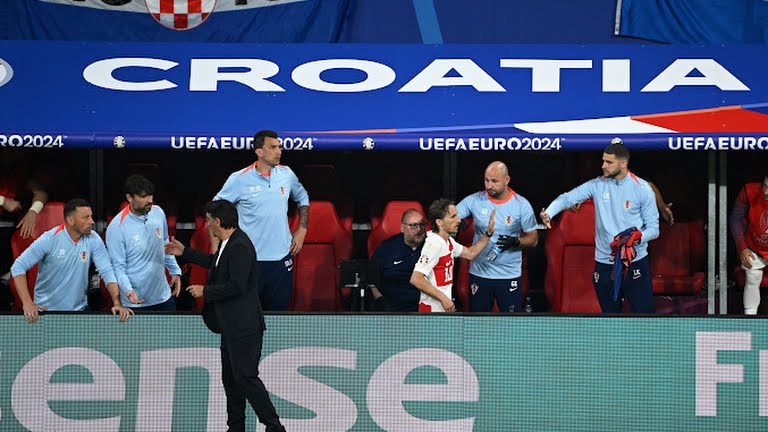You can never write them off. That sentence applied to Croatia as the last of eight minutes of added time ticked down, a chequered cauldron of fans just about holding itself in before the eruption that would follow another victory for the history books. At that point it applied more than ever to Luka Modric, too. He had missed a penalty and then, with virtually the next action, atoned with one of the most thrilling moments of the summer. Forget one last dance: Leipzig was poised to rock until daylight.
Then it came to perfectly describe Italy. The holders were poised to sweat on the third-place shakedown, having hurled bodies into the opposition half without fashioning the kind of chance that would assuage their worries. Somebody needed to take the initiative and it was Riccardo Calafiori, the elegant centre-back from Bologna, who broke the lines and glided into a position Croatia simply did not anticipate. Their midfield was chasing him as he approached the penalty area; he passed left to an open Mattia Zaccagni. The substitute’s curled finish met the moment and Italy were somehow through.
They will have to perform better than this if they are to overcome a more polished Switzerland team on Saturday. Apart from a 15-minute spell in the first half they never really had the better of Croatia, who stepped up a gear after the interval. But perhaps the momentum from such an astonishing finale will be transformative. Stranger things have happened and Luciano Spalletti, in a rambling and at times fractious press conference, certainly had little time for expressions of negativity afterwards.
The real sadness came in seeing Modric, a desolate-looking figure upon collecting a man of the match award that is unlikely to be prominent in his cabinet, salute his public after full time. He turns 39 in two and a half months and, if this was his last international appearance, the records will at least note he marked it by becoming the European Championship’s oldest goalscorer. It could, should, have been a defining night’s work but instead resembled an entire career flashing at warp speed in front of disbelieving eyes.
What a staggering sequence of play it was when Modric, unrelenting when Croatia needed him, wrote his part of the narrative. They had roared into the second period, knowing anything bar a win would all but eliminate them from the tournament, and saw their chance when Andrej Kramaric’s shot flicked the arm of Davide Frattesi. It took a VAR check but Croatia’s vehement appeals were grounded in reality: Frattesi’s limb was outstretched and few would have bet against Modric completing the job from there.
The look of anguish that crossed his face when Gianluigi Donnarumma dived left to parry resembled, for the briefest moment, that of a man crushed. In fact there would be far more of that later. For the moment Modric picked himself up, as he always has, and made amends within 33 seconds. A deep Luka Sucic cross from the inside right was guided towards goal by Ante Budimir, who had been introduced by Zlatko Dalic at the break, and Donnarumma again saved brilliantly. But there was Modric, running around the ball and hammering in emphatically, to spark unbridled pandemonium.
Beyond a header over by Alessandro Bastoni, who had been denied by Dominik Livakovic earlier on, Italy struggled to respond. Enrico Chiesa’s introduction initially sparked life but it was Bastoni, snicking a Marcelo Brozovic cross away from the lurking Budimir’s head, who stopped things deteriorating. Losing any more heavily could have complicated Italy’s hopes even further.
Instead they turned everything on its head and it was mightily harsh on a Croatia side that, Spalletti had admitted before the game, was technically superior. Sucic tested Donnarumma with a piledriver early on and, while Italy could certainly have gone ahead through Bastoni or Mateo Retegui, this was far more akin to the smart, accomplished unit whose midfield can almost think opponents out of games. Josko Gvardiol, neatly extricating himself from a tight space in his own half, earned acclaim from all four sides of the stadium and Modric belied his years once again by sprinting up the left flank.
Spalletti’s switch to a 3-5-2 system had yielded limited results, Federico Dimarco perhaps not fully fit at left wing-back and Giovanni Di Lorenzo squandering some inviting positions on the opposite side. This felt, as the first half drew on, like a knife-edge affair. Both teams were snapping, hustling, prowling with intent; smoke drifted through the air from a series of fireworks set off behind Livakovic’s goal and it was hard not to feel the atmosphere was pregnant with the kind of twist that would unleash chaos.
Modric provided it once, then twice, and then Zaccagni caused the most grievous of wounds. Croatia cannot head home just yet: if four different results go their way they may still be pulled out of the fire, and there is no question Modric would deserve it. A win for England over Slovenia by at least three unanswered goals would give them hope. Modric would not commit to a future in Croatia’s shirt afterwards; it was not the time, but a World Cup appearance at 40 would be extraordinary. When he was replaced by Lovro Majer in the 80th minute, it seemed the job might have been done. Instead, a maestro’s race may be run.








More Stories
Amorim insists Fernandes not leaving Manchester United amid Madrid reports
How debt burden pushed Nigerian boxer Segun Olanrewaju to a fight that took his life
Nigeria Taekwondo Federation boss, Abdullahi Saidu dies at 53